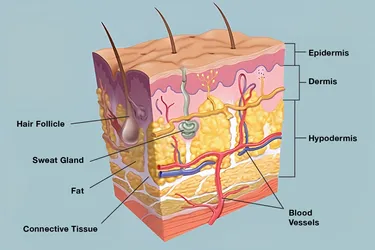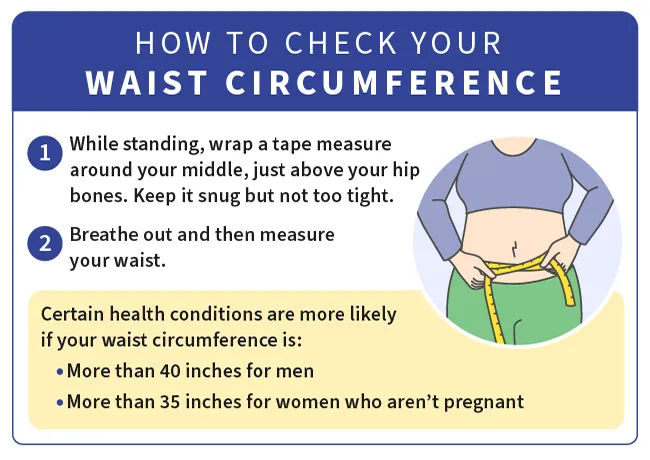Today at a Glance
- Is it possible to get rid of belly fat (only) through targeted methods?
- What types of "belly fat" exist?
- How do you measure belly fat / visceral fat?
- How to get rid of belly fat (4 steps)

As a nutrition coach, I often get asked this question:
“Ketty, how do you get rid of belly fat?”
Belly fat is not just a matter of appearance (look and feel), but more importantly, it’s a health issue.
The good news is that you don’t need much to get rid of belly fat.
It is uncomplicated but difficult for many.
It’s simple, not easy.
So the first question we need to clear is:
Is it possible to get rid of belly fat (only) through targeted methods?
The answer is NO.
No specific food or exercise targets only belly fat.
To get rid of belly fat, you need to “simply” lose weight.
This might seem like a hard pill to swallow, but there are no quick fixes.
No magic pill, and no magic food that sucks out your belly fat.
Speaking of sucking out belly fat…
Liposuction for cosmetic fat removal doesn’t extend to the inside of the abdominal wall, only affecting the surface area. As people often don’t alter their habits and lifestyle, which originally led to their current condition, they tend to gain weight afterward.
"Every day is another chance to get stronger, to eat better, to live healthier, and to carve out the confident, courageous version that's hidden below the surface."
— Ketty Minissale
What types of “belly fat” exist?
When we talk about “belly fat”, we typically mean the excess weight around the waist.
There are two types of belly fat:
- Subcutaneous fat
- Visceral adipose tissue
Let’s dig deeper here:
1. Subcutaneous fat
Subcutaneous fat is the fat located directly beneath your skin.

This is the fat that is visible and can be felt when you pinch the excess skin and tissue around your midsection.
2. Visceral adipose tissue
However, there’s another type of belly fat known as “visceral adipose tissue”, which is located deeper inside your abdomen.
It encircles your lungs, heart, liver, and other organs.
This type of “belly fat” is exactly what leads to most of the severe health problems.
In fact, we need a small amount of visceral fat as it provides some protection around our organs.
However, an excessive amount of this visceral fat has been associated with high blood pressure, type 2 diabetes, dementia, and certain types of cancer.
How do you measure belly fat / visceral fat?
To the point:
Imaging examinations, such as computed tomography and magnetic resonance imaging, are notably precise. However, they are impractical and costly methods.
DEXA, the Dual X-ray Absorptiometry used to measure bone density (thickness and strength of bones), is a good alternative for obtaining precise information on visceral fat.
Let’s make this easy and uncomplicated:
Even without sophisticated instruments, we can get a good idea. Simply use a dressmaker’s tape to measure your waist circumference.
For women and men, the advisable waist circumference limits to not exceed are 89 cm (35 inches) and 102 cm (40 inches) respectively. However, it would be even better to stay below 80 cm (31.5 inches) for women and 94 cm (37 inches) for men.
A more precise value can then be calculated through the Visceral Adiposity Index, which also takes into account blood cholesterol values.

How to get rid of belly fat (4 Steps)
There are four keys to controlling belly fat: stress management, sleep, exercise, and diet.
Let’s briefly go through them:
1. Stress management
Stress can hijack your metabolism by triggering the release of cortisol, a hormone that prompts the body to store fat, particularly in the abdominal area.
This is part of the body’s “fight-or-flight” response, which is not designed to be continuously active, as is often the case with modern day lives. The more responsibility the higher the stress level.
The 3 best scientifically proven ways to manage stress:
- Regular exercise
- Mindfulness and meditation
- Supportive social connection
Pro Tip: If you could only afford the time to do one of these things, exercise probably has the most immediate benefits, because it gets at both belly fat and stress.
2. Sleep
Sleep significantly affects weight management, as well as our body fat and belly fat.
In one study, people who got 6 to 7 hours of sleep per night gained less visceral fat over 5 years compared to those who slept 5 or fewer hours per night or 8 or more hours per night.
For instance, when you’re sleep-deprived, your body produces less leptin, the hormone that signals when you should stop eating.
That’s a double-edged sword because a higher level of ghrelin and a lower level of leptin create the perfect conditions for weight gain and an increase in visceral fat.
Each of us has different needs for balanced sleep hygiene.
3. Exercise
Movement is fundamental to get rid of belly fat. Even without losing weight, you may decrease visceral fat and gain muscle mass.
Aim for at least 30 minutes of moderate exercise, a minimum of 5 days a week. Brisk walking counts too, as long as it’s vigorous enough to make you sweat, breathe harder, and increase your heart rate.
Our experience: Markus is generally leaner when he averages 8,000 to 10,000 steps per day. And progressive strength training is still the best option to increase strength and muscle mass over time.
4. Diet
As said, there’s no specific diet that targets belly fat. However, when you lose weight following any diet, belly fat is often the first to go.
Choose a diet that not only helps you lose overall weight and visceral fat but also one that you can sustain in the long run. I recommend a nutrient-dense diet balanced with fiber-rich carbohydrates, protein, and healthy fats. Plant-heavy is better than keto, for example.
Here some guidelines: Avoid sugars such as sweet beverages, fructose-sweetened foods, and simple sugars, as these feed the belly fat. Minimize the consumption of ultra-processed foods and include as many whole foods as possible in your diet.
If you’re thinking about adopting healthier eating habits to lose belly fat, here’s your way to get sustainably lean.
That’s it for today.
Hope you enjoyed it (and learned something new).
As always, stay fit, stay active, and enjoy your life.
Ketty & Markus








